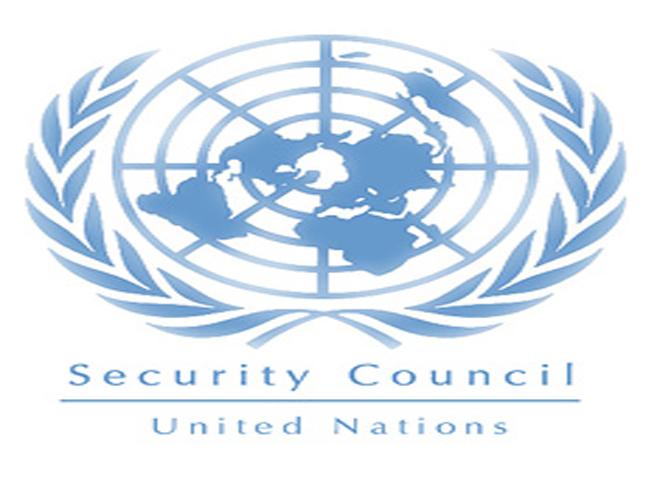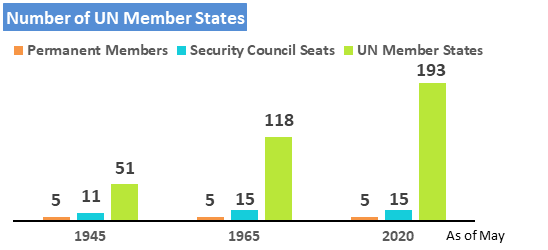Why is the need of expansion the number of members in Security Council

Table of Contents
ToggleINTRODUCTION:
Security Council is one of the most important Organ of the United nation. It is the continuously functioning organ of the United nation organization. This organ of the UNO is known as the police of the world.
The United Nations Security Council is a cornerstone of global diplomacy and peacekeeping efforts. Established in 1945 following the end of World War II, its primary mandate is to maintain international peace and security.
It consists of 15 members. Among these 15 members, five members, namely, Chaina, France, USSR (now it is the Russian federation), United Kingdom, United States of America are permanent members with power of Veto. The other 10 members known as non-permanent members are elected for a term of two years.
2. EXPANSION OF THE SECURITY COUNCIL:
The expansion of the United Nations Security Council has been a topic of debate and discussion for many years. The Security Council is an important organ of the UN. The first and foremost purpose of the organization is to maintain international peace and security. The security council has been given the primary responsibility for maintaining such peace and security and all the members of the United nation have agreed that in discharging this primary responsibility, further the members have also agreed to carry out the decisions of the security council.
The Security Council, established in 1945, it has remained largely unchanged in terms of its structure, despite significant shifts in global power dynamics and the emergence of new geopolitical realities.
In November 2017, the membership of the general assembly is 193, but the strengths of the security council are remained unchanged. Thus, only 7.85% of the total members of the United Nation organization are in Security Council.
Therefore, in view of the universalization of the organization, the number of the members of security council needs to be increased at least to 25.

Fig.: Indicate the expansion of members in security council since establishment of united nation from till now.
Efforts to expand the Security Council typically focus on increasing both the permanent and non-permanent membership to better reflect the diversity of the international community and to enhance the Council’s legitimacy and effectiveness.
Proposals for expansion often include granting permanent membership to additional countries, particularly those considered major powers or regional influencers, such as India, Brazil, Germany, and Japan. These countries, often referred to as the Group of Four (G4), advocate for permanent seats on the Security Council to better represent their respective regions and contribute to global decision-making.
Other proposals revolve around increasing the number of non-permanent seats, allowing for greater rotation and representation from different regions of the world. Advocates argue that expanding the Council’s membership would make it more inclusive, transparent, and reflective of the realities of the 21st century.
However, expanding the Security Council is a complex and contentious process, requiring consensus among member states, particularly the current permanent members who hold veto power. Discussions on reforming the Security Council have encountered various challenges, including divergent interests among member states, concerns about diluting the Council’s effectiveness, and resistance from existing permanent members reluctant to share their privileged status.
Despite numerous proposals and debates, if the security council is not reformed, the world is doomed to face graver consequences as compared to the sufferings of World War second. significant progress towards the expansion of the Security Council has yet to be achieved. However, the ongoing dialogue underscores the importance of adapting international institutions to meet the evolving needs of the global community.
NEED THE EXPANSION FOR THE MEMBERSHIP OF THE SECURITY COUNCIL:
It is not easy to expand the security council membership. The five permanent members enjoy the right to veto any enforcement proposal. They have exercised this right not in furtherance of charter principles and purposes but for their own interests. Thus, the question of expansion of the security council is complex and ticklish.
But the present structure of the council does not reflect the true global position.
THE NEED OF EXPANSION ARISES FROM SEVERAL FACTORS:
Expanding the membership of the United Nations Security Council is a complex and multifaceted issue, rife with challenges that reflect the intricate web of geopolitical dynamics, historical legacies, and divergent national interests shaping the contemporary global landscape. While the need for reform is widely recognized, achieving consensus on how to expand the Security Council’s membership remains a daunting task. Here, we delve into some of the key challenges faced in increasing the membership of the Security Council in today’s world.
Veto Power Dynamics:
The challenges of expanding the Security Council’s membership are the entrenched interests of the current permanent members—China, France, Russia, the United Kingdom, and the United States—each wielding a veto power. These nations jealously guard their privileged status, fearing that an expansion of permanent membership could dilute their influence and undermine their ability to shape global affairs according to their national interests. As such, proposals for expansion often encounter resistance from existing permanent members reluctant to cede their veto power or share the Council’s decision-making authority.
Regional Representation and Rivalries:
This challenge lies in reconciling the aspirations of various regional blocs and groupings for increased representation in the Security Council. The African Union, for instance, advocates for greater representation of African countries, citing the continent’s significant contributions to peacekeeping operations and its underrepresentation on the Council. Similarly, the Group of Four (G4)—comprising India, Brazil, Germany, and Japan—pushes for permanent seats, arguing that their economic, political, and military prowess warrants inclusion. Balancing the competing demands of different regions while avoiding exacerbating existing rivalries and tensions poses a formidable diplomatic challenge.
Criteria for Membership:
Agreeing on the criteria for selecting new permanent members is another stumbling block in reform efforts. Questions abound regarding which countries should be granted permanent seats and based on what criteria—economic power, military capabilities, population size, or contributions to global peace and security. The diversity of perspectives among member states makes finding a consensus on these criteria exceedingly difficult, further complicating reform negotiations.
Resistance from Some Member States:
Not all member states are supportive of proposals for expanding the Security Council’s membership. Some smaller or less influential nations fear that an increase in permanent membership would marginalize their voices and diminish their influence within the UN system. Overcoming resistance from these countries requires skillful diplomacy and persuasion, as well as assurances that their interests will be safeguarded in any reform process.
Procedural Hurdles:
Amending the United Nations Charter to expand the Security Council’s membership is a formidable undertaking fraught with procedural hurdles. It requires the approval of two-thirds of the UN General Assembly and ratification by two-thirds of member states, including all current permanent members. Negotiating such a consensus amidst the diverse interests and priorities of member states is a daunting task that requires sustained diplomatic efforts and compromise.
TODAY’S WORLD FACES VARIOUS CHALLENGES:
There are some challenges including——
1. Economic development
2. Environmental issues
3. Non-proliferation of nuclear arms
4. International terrorism
5. And protection and promotion of human rights.
CONCLUSION
The need for reforming the Security Council’s membership is widely acknowledged, the challenges inherent in achieving this goal are formidable. Addressing issues such as veto power dynamics, regional representation and rivalries, criteria for membership, resistance from some member states, and procedural hurdles will require visionary leadership, political will, and a commitment to multilateralism.
Despite the daunting nature of these challenges, the imperative of adapting international institutions to better reflect the realities of the contemporary world remains paramount.



3 comments